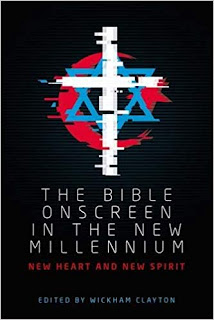The Red Tent (2014)
 "My name means nothing to you. My memory is dust... I became a footnote, my story a brief detour between the well-known history of my father Jacob, and the celebrated chronicle of Joseph, my brother."
"My name means nothing to you. My memory is dust... I became a footnote, my story a brief detour between the well-known history of my father Jacob, and the celebrated chronicle of Joseph, my brother." So Dinah (The White Queen's Rebecca Ferguson) introduces herself at the start of both Anita Diamant's novel and this mini-series adaptation directed by Roger Young. The Jacob and Joseph referred to are those we meet in the latter chapters of Genesis - the founding father of Israel and his most beloved son. But this is not really their story; neither is it a conventional retelling of Dinah's own story. This is a fanciful exploration of the women of Jacob's clan on whom rests so much, yet receive so little credit. It's not just a film about Dinah; it's also about Leah and Rachel, Bilhah and Zilpah, Rebecca, Tamar and the wife of Laban. It's an attempt to get behind the female names that tend to get skipped over, or only valued for their motherhood, and to look at the events of Genesis from their perspective and provide insights from their point of view.
So this isn't a film for those who might like to term themselves as biblical purists. For one thing the "rape" of Dinah portrayed in the film is nothing of the sort, at least by modern standards. Dinah is presented as a self-determining woman who falls in love with a tribal prince and makes her own decision to sleep with him. But of course in biblical times women were viewed as property of their husbands/fathers. It's at least possible that the prevailing view was that consent to sexual acts on their bodies were not theirs to give but that of their fathers. By this world-view it would be impossible for Dinah to give her consent - it was not seen as hers to give., it was Jacob's. The shocking possibility of that shows us what a radically different world we live in today, but in highlighting the difference the film perhaps strays too far into anachronism. If women really were as oppressed as this - denied consent even over their own bodies - then how likely it is that they would dare to defy this social consensus?
None of this is to suggest that Jacob (Iain Glen) is portrayed as that sort of patriarchal leader. Indeed he too is portrayed at taking a more progressive view of women's rights than the presumed cultural norm. In an early conversation in the titular red tent - the private space of the tribe's leading women - we're told that Jacob treats his concubines (themselves the daughters of Laban's concubines) as proper wives. Not dissimilarly Jacob is "in" on the switch that happens on the day of his first wedding. When Rachel gets cold feet, her similarly smitten sister Leah (Minnie Driver) offers to step in to prevent her embarrassment. Jacob discovers the switch before consummation, but he's happy to go along with the ruse and blame Laban in the morning. This the audience accepts because, really, Laban is the piece's only villain. He is later shown to beat his wife - behaviour that makes Jacob's, at times, rather suspect behaviour seem more acceptable.
Part of the interest of the camp's red tent is it gets to the heart of the question that intrigues so many about polygamous societies: how did the opposing wives get on? The obvious expectation is that there would be all manner of arguments, jealousy and disagreements, though some (mostly male) commentators have sought to suggest that the women would recognise that the system was the best for all and just get on with it as best they could. The film's take is a slightly different one - Jacob's wives are already sisters and the (initial) shared marriage is their idea rather than his (at least initially), furthermore Bilhah and Zilpah are shown as empowered and equal members of the family. I'm not sure it will satisfy feminists any more than it will biblical traditionalists, but it's intriguing to watch such a perspective played out.
The casting here is rather interesting, not least in this respect. Ferguson was excellent as Elizabeth Woodville in The White Queen - one of my favourite historical TV series of recent times. There's much common ground here as well. Both stories take traditional patriarchal stories and tell them from a female point of view - suggesting their leads wielded more power than they are traditionally ascribed. And then there is the similarity in the two character's social standing. Both start off as relatively well off women who fall in love with a man on his way to becoming king. Their marriage for love flies in the face of the conventional marriage-for-strategic-advantage that was expected of them and ends up causing a vast number of deaths. Furthermore, both Dinah and Queen Elizabeth rely heavily on the traditional female wisdom of their mothers, using curses and potions alongside a shared understanding of mid-wifery. It places them at odds with the patriarchal order, gains her not unfounded accusations of witch-craft yet proves to have access to a deeper understanding of the world that the dismissive men could ever appreciate. In fairness this it's not totally inconsistent with many of the beliefs of the time, even if the new-age spin on it is, at times, a bit over the top. The other casting is mixed. It's not hard to accept that Jacob, who the Bible seems to suggest was a fairly shallow man, might be so totally smitten for Morena Baccarin, but casting Minnie Driver as the "plain" one is a stretch too far. If the Leah had really looked like (film star) Minnie Driver, Jacob might never have felt the need to work for that second seven years.
Yet for all the female empowerment it's the actions of Jacob that drive the plot on into the second and third 'acts'. Dinah and the other women voice their displeasure at Laban's treatment of his wife; but it is Jacob who decides to return to the land of his father. Dinah's romantic involvement may be the spark that propels the violence between Israel and the inhabitants of Shechem; but it was Jacob's decision to move to the area and develop closer ties with Hamor that set the wheels in motion.
When the massacre of the Shechemites does comes it's vicious and very bloody. Up to this point everything about the production is typical of Young's work on The Bible Collection. It's filmed in Morocco and the skies, sets, costumes, indeed everything about the look and feel of the film - even the slightly uneven mix of lesser Hollywood stars with local extras - feels like the earlier series. But the massacre is jarringly out of sync with anything from that earlier work. Indeed it feels far more of a piece with the History Channel's recent series The Bible (2013), where the violence was very much ramped up. When I started writing this review I thought that discrepancy very much a weakness, but now writing these words it feels like it might actually be one of the film's hidden strengths. After all here, at least, it can be argued that Levi and Simon/Simeon's violence should shock us. It's an unprecedented tear in the social formalities of the day. Reparation had been made, or, at least, so it was thought. A treaty had been made. Simeon and Levi's act leaves Jacob reeling in disbelief and fear for his tribe's future. It's not insignificant that when this horrific event was written down centuries later, it's still Simeon and Levi who are still specifically remembered as being responsible. In many places Jacob's sons, and their tribes act as one, but not with this. Young's jarring change of gears jolts the viewer out of a relatively homely narrative of mutual sisterhood into the horrors of violent and dominant patriarchy when it operates without restraint.
Despite his horror at the events Jacob still struggles to appreciate the weaknesses inherent in the whole woman-as-property system. Jacob tries to put some of the blame for his son's actions on what he calls Shechem and Dinah's "sin". "There was no sin" Dinah fires back, "we were married...Your sons have slaughtered righteous men". The rift between father and daughter is so great that Dinah flees into the arms of her mother-in-law and the two move to Egypt, allowing the film to continue to interweave it's fictional exploration with the more established story of Joseph in Egypt. That said though, the film starts to become a little contrived in the second half and the points of interest, for Bible film fans at least, start to wane. That said Dinah's eventual reunion with Joseph is touchingly done.
Not infrequently I end reviews by describing them as "an interesting addition to the canon", but in some senses this doesn't quite seem apt given the projects aim to create an alternative story within and around the text of Genesis. Certainly that makes this an interesting experiment which, in turn, throws fresh light on one of the more overlooked parts of the Bible and offers a good deal of food for thought. It isn't for everyone, but, given that the original story is hardly beloved amongst the faithful, criticisms on its original release were rather half-hearted. It's appropriate I feel that The Red Tent is a film which nurtures thoughtful discussion rather than creating unnecessary conflict.
=======
Incidentally, you might like to read the less appreciative, but more humourous and thorough discussion of the film called "159 Thoughts We Had While Watching The Red Tent"
Labels: Bible Collection (The), Dinah, Genesis, Jacob, Red Tent













2 Comments:
At 12:08 am, April 27, 2019, Anonymous said…
Anonymous said…
It seems simplistic to me to read Dinah's story entirely through the lens of "patriarchy" and gender politics. In a culture such as Dinah's, it was not the individual but the kinship institution that was primary. Familism was the bedrock principle of the collectivistic society in which Dinah lived. Family integrity would have been valued above all else. This was also an honor-shame society, so when Dinah married a man without her father's blessing, she seriously shamed her father and family. Samson was rebellious and he selected his own fiance (a Philistine!) but even he went to his parents and asked them to make the arrangements with her family. Anything less would have been a huge insult. In the film Dinah's actions essentially forced Jacob to ask for the circumcisions to take place. He was culturally required to do something to save face, so he made a decision that would protect his honor and by extension the honor of his kinship group.
At 11:53 am, April 28, 2019, Matt Page said…
Matt Page said…
The biblical text is clear that Dinah was raped so she didn't bring shame upon the family. The film's reworking of these ideas don't quite come off.
Post a Comment
<< Home